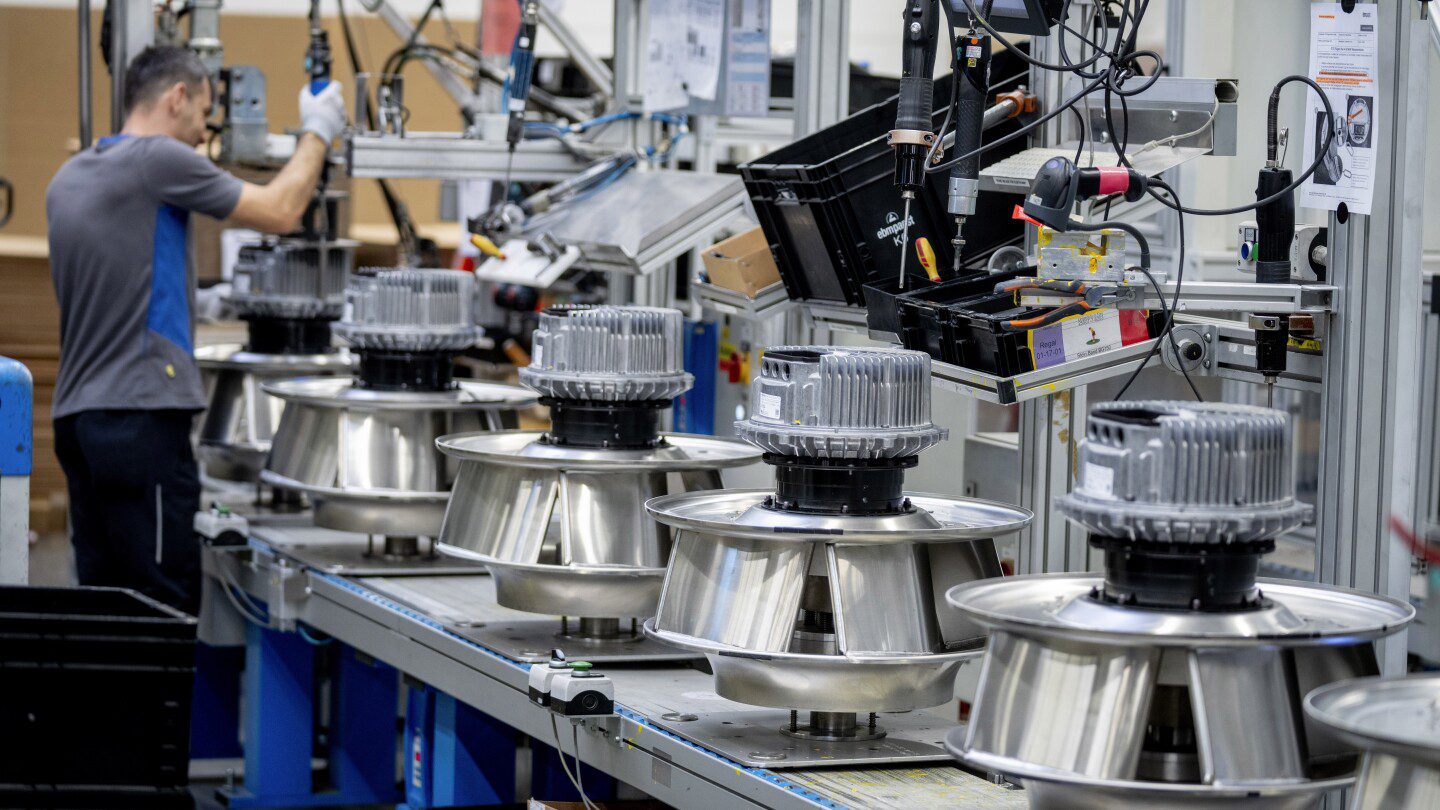
MULFINGEN, Germany (AP) — Germany is at a crossroads and requires a new approach to business. The previous model, reliant on inexpensive natural gas from Russia and strong exports to China, has become ineffective, plunging Europe’s largest economy into stagnation and uncertainty regarding its future.
Formulating an innovative growth strategy will be the paramount challenge for the incoming administration, following the national elections scheduled for February 23, seven months ahead of the original timeline. The country, once renowned for its high-quality products, has not experienced substantial economic growth in the last five years.
Various factors have contributed to Germany’s decline from industrial leader to post-pandemic laggard: excessive bureaucracy, a lack of skilled labor, sluggish technological adoption, and ambiguous directives from the outgoing coalition government. Furthermore, increasing competition from China and soaring energy costs stemming from the conflict in Ukraine further exacerbate these issues.
“We need a more business- and enterprise-friendly political environment,” stated Klaus Geissdoerfer, CEO of the industrial fan manufacturer EBM-Papst. “Germany has exceptional talent and reputable companies, but there is currently a lack of political consideration.”
Growing Business Discontent as Elections Approach
EBM-Papst, which boasts annual revenues of 2.5 billion euros ($2.6 billion) and operates plants on three continents, claims to be the global leader in its sector. However, the company reported a 4.1% drop in revenue, particularly impacted by challenges in Germany.
Geissdoerfer noted that the company’s heating technology division suffered an 18.7% sales decline due to a poorly executed initiative urging property owners to transition from gas furnaces to more environmentally friendly electric heat pumps.
The Building Energy Act proposed by Chancellor Olaf Scholz’s coalition was so perplexing that many homeowners delayed upgrading their heating systems or hastily purchased new gas heaters before the new laws were implemented, leading to a dip in demand for EBM-Papst’s quiet heat pump fans.
“Consumers were asking, ‘What is the best technology for my home?’” Geissdoerfer remarked. “Consequently, many decided it was safer to wait.”
Geissdoerfer echoed concerns heard throughout the industry regarding Germany’s excessive bureaucracy. A recent law mandating public and private sectors to reduce energy use for climate protection requires EBM-Papst to dedicate staff to report compliance efforts.
“Instead of implementing energy-saving measures, they’re caught up in paperwork,” the CEO lamented, emphasizing that such administrative tasks take away from the company’s focus on energy-efficient solutions. “I truly hope the incoming government can address this issue; it’s currently overwhelming.”
EBM-Papst is moving towards areas identified by economists as key for Germany’s industrial future: green and digital technology. Based in Mulfingen, a quaint town of 3,700 in rural southern Germany, the company is supplying energy-efficient cooling systems to energy-demanding AI data centers and exploring AI features to assist tech companies in optimizing power usage and predicting equipment maintenance needs.
In response to Germany’s economic difficulties, EBM-Papst is shifting its investment focus towards Asia and the United States. The company now services U.S. clients from facilities in Farmington, Connecticut, and Telford, Tennessee. Though initiated prior to the pandemic, these localization efforts act as a safeguard against potential future import tariffs implemented by U.S. President Donald Trump.
Dependency on China and Russia Creates Dilemmas
Beyond domestic challenges, international relations have further complicated matters. Russia has halted the majority of its natural gas exports in response to Germany’s support for Ukraine. Consequently, electricity costs—which weigh heavily on industry—have soared to 2.5 times higher than rates in the U.S. and China.
The Mecanindus-Vogelsang Group, which produces precision components for automotive manufacturers and other sectors, reports that its German plants face electricity costs that are double those of its American facilities in Mt. Sterling, Kentucky, and Lakewood, New Jersey. This equates to added costs of 100,000 euros and represents “a gigantic competitive disadvantage,” according to CEO Ulrich Flatken.
“To prevent deindustrialization, which is already in progress, we desperately need energy prices that are competitive on the international stage,” Flatken stressed.
Another setback has arisen from China, which, throughout the 2010s, was a significant market for German machinery and automobiles. As Chinese manufacturers began producing similar products, supported by government subsidies, German exports faced a decline.
Germany’s economy has contracted for the past two consecutive years. By the close of 2024, it is projected to be only 0.3% larger than it was in 2019, pre-pandemic, while the U.S. economy has grown by 11.4%, and China’s economy has expanded by 25.8%, according to Germany’s Federal Statistical Office.
Facing Complacency and Despair
Marcel Fratzscher, president of the German Institute for Economic Research, attributes part of the problem to a sense of complacency that emerged during the export boom to China. He asserts that German companies have been slow to react to technological evolutions, such as the shift towards electric vehicles.
“Many enjoyed the success of the 2010s and have been too sluggish to recognize the need for change and adaptation,” Fratzscher noted.
As economic struggles persist, a sentiment of “mental depression” has taken hold, with significant pessimism affecting both businesses and citizens, which he believes is a key contributing factor to reduced investments from companies.
Numerous business leaders and economists contend that the next administration in Germany should work on easing constitutional constraints on debt to bolster public expenditure on infrastructure and education. Fratzscher questions whether political leaders will embrace the necessary transformations as the economy struggles.
“Germany’s political system has been fundamentally built on consensus and stability for the past 75 years, which complicates rapid change,” he stated. “A shift in mindset is essential; we must accelerate our approach to economic transformation.”









